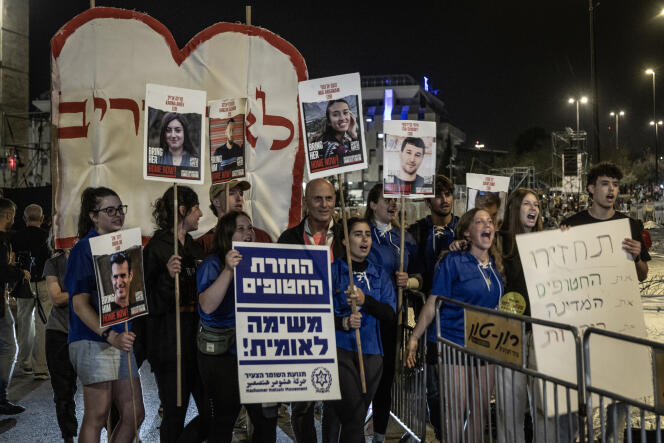


The streets of Jerusalem returned to a sort of lively energy that had disappeared for the last six months, on Sunday, March 31. At the call of opponents of Benjamin Netanyahu's government, tens of thousands of demonstrators gathered around the Knesset, demanding elections and an agreement with Hamas, which would allow the release of hostages in Gaza. Fires were lit on the Menachem Begin expressway.
Late in the evening, around 500 people set up a tent city on a boulevard leading up to parliament. They intended to remain there until the lawmakers' spring recess, scheduled for the end of the week, and were calling on elected representatives to continue sitting while the hostages remain in Gaza.
The scale of this rally cannot be compared with the historic demonstrations that crowded the country's streets every week last year, right up to the eve of the war. At the time, a majority of Israelis were opposed to a shake-up of the country's institutional balance sought by Netanyahu and his religious fundamentalist allies – described by his opponents as a "coup d'état." But a kind of awakening is taking place. It had been expected for months, after a long phase of uneasy national solidarity, which imposed silence on the streets while tens of thousands of reservists remained mobilized.
In part, the same groups are behind the action – the Kaplan Force, companies in the new technologies sector giving free rein to their employees wishing to demonstrate this week and veterans of the Brothers in Arms (an organization of reserve men and women from various units in the IDF). One of the movement's leaders, former tech entrepreneur Moshe Radman, said the aim was to demand a deadline for elections to be announced.
The protest did not resolve the deep divisions between these representatives of different strands of Israeli society, which had been overcome last year. The Brothers in Arms, who claim to be non-partisan, made their presence felt away from the main procession. They went to the ultra-Orthodox neighborhoods of Jerusalem to challenge the Haredim (the "God-fearing"), who have demanded a law perpetuating their exemption from military service from Netanyahu.
Egg-throwing, thefts of Israeli flags by fiercely anti-Zionist religious students, police ramparts: The videos of these scenes of scuffles are resonating strongly with Israeli society, which is less and less tolerant of the Haredim's exemption from service (18% of young people of military age), at a time when the army is short of manpower, and reservists are beginning to receive their recall orders for the spring.
You have 65.32% of this article left to read. The rest is for subscribers only.
